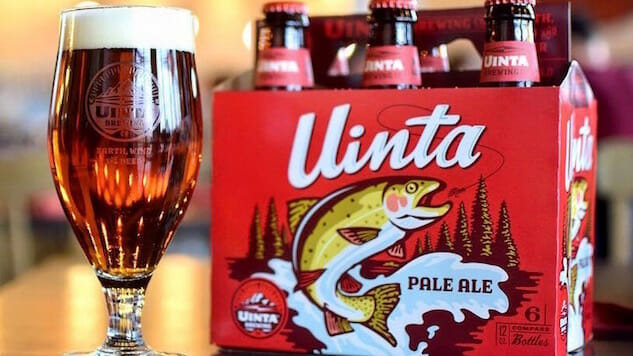Talking Beer Laws with Uinta Brewing
Photo via Uinta Brewing/Facebook
Liquor laws in the United States are complicated, varying state by state even though many breweries distribute across borders and beyond. Uinta Brewing Company was founded in 1993 in Salt Lake City by Will Hamill.
While every state has its quirky laws – from distribution limitations to the exact material of brewery take-home containers and even what temperature beer can be sold at – Utah was often one of the more extreme examples with a membership fee for bars and social clubs. The membership concept was eliminated almost a decade ago, but many still think of Utah as a unique legislative landscape.
One unique rule is that visitors to Uinta’s brewery can buy any of their beers, from the sessionable Cutthroat Pale Ale to Anniversary Barleywine, but anything over 4% ABV will be sold and served in bottle, not draft.
With small breweries making cultural waves in Utah and across the US, Paste caught up with Hamill to talk about liquor laws and how they’ve affected his brand, both in-state and their growth into 34 states – each with their own unique rules and regulations.
Paste: How have Utah brewery laws changed since you opened? Do you see a changing attitude reflected on a national scale?
Will Hamill: We opened up in a refinished auto mechanic’s building in 1993 and started producing beer for draft only. That was unique for the state of Utah. When we started doing that, it brought a lot of awareness because we were different. There was already a brewpub in Utah.
To give a background, in Utah you can manufacture beer over 3.2% by weigh or 4% by volume — most people quantify alcohol by volume. In Utah you can manufacture beer over 4% but it has to go through a controlled state: through the liquor commission and it’s available only in bottles not draft. However, all the beer at 4% or below is available at grocery stores, convenience stores. It’s uncontrolled and available throughout the state. It’s very accessible.
That still resides today. It’s not much of a limitation from a manufacturing viewpoint.
Paste: Do you aim your production more at liquor stores at draft outlets?
Will Hamill: We sell 90% of our beer in Utah through the grocery, convenience store, bars and then 10% through the liquor commission, which is 4% or above.
Paste: How has that shaped how you’ve grown?
-

-

-

-

-

-

-

-

-

-

-

-

-

-

-

-

-

-

-

-

-

-

-

-

-

-

-

-

-

-

-

-

-

-

-

-

-

-

-

-








































